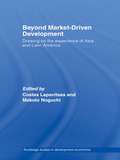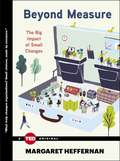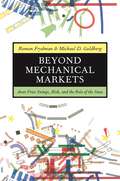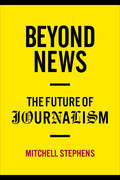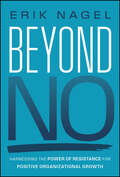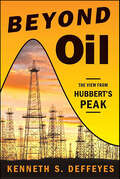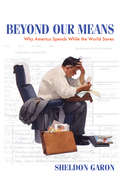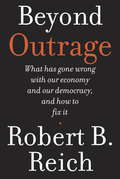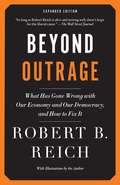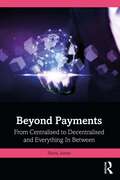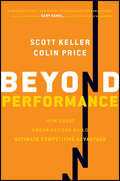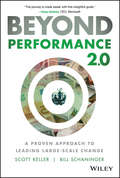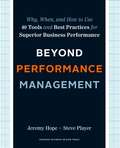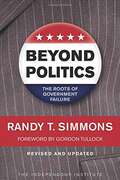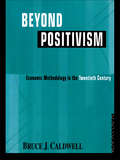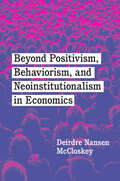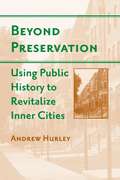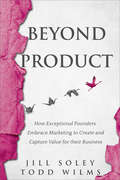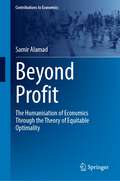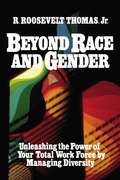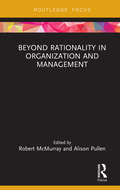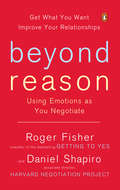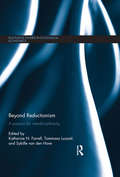- Table View
- List View
Beyond Market-Driven Development: Drawing on the Experience of Asia and Latin America (Routledge Studies in Development Economics #Vol. 43)
by Costas Lapavitsas Makoto NoguchiBecause their economies were regulated, their financial systems ‘repressed’ and their states interventionist, for many years the countries of East Asia challenged the Washington consensus, offering an alternative development paradigm. However, in the 1990’s, Asian capitalism was disrupted following Japan’s stagnation and the financial crisis of 1997-98. Treading the unexplored theoretical terrain created by the simultaneous decline of the Washington Consensus and Asian developmentalism, this revealing book analyzes the comparative political economy of East Asia and Latin America. Divided into four key sections, it covers: Theoretical Framework Results of Globalization Converging and Diverging of Paths of Economic Development Finance and Regionalism. Through the juxtaposition of countries in East Asia and Latin America, leading academics analyze the impact of government intervention, institutional malfunction, social transformation and financial change as well as conflict and power on economic development. This book will prove to be invaluable to students and academics of development economics.
Beyond Mass Customization: Co-Configuration
by Bart Victor Andrew C. BoyntonWith co-configuration, companies can create products that are not only made to order, but perpetually remake themselves as customers' needs change. To achieve this kind of customer intelligence, a company must continuously configure its products and services in interaction with the customer.
Beyond Measure: The Big Impact of Small Changes (TED Books)
by Margaret HeffernanA powerful manifesto for CEOs and employees alike: Influential and award-winning business leader Margaret Heffernan reveals how organizations can build ideal workplace cultures and create seismic shifts by making deceptively small changes.By implementing sweeping changes, businesses often think it’s possible to do better, to earn more, and have happier employees. So why does engagement prove so difficult and productivity so elusive? In Beyond Measure, Margaret Heffernan looks back over her decades spent overseeing different organizations and comes to a counterintuitive conclusion: it’s the small shifts that have the greatest impact. Heffernan argues that building the strongest organization can be accelerated by implementing seemingly small changes, such as embracing conflict as a creative catalyst; using every mind on the team; celebrating mistakes; speaking up and listening more; and encouraging time off from work. Packed with incredible anecdotes and startling statistics, Beyond Measure takes us on a fascinating tour across the globe, highlighting disparate businesses and revealing how they’ve managed to change themselves in big ways through incremental shifts. How did the CIA revolutionize their intelligence gathering with one simple question? How did one organization increase their revenue by $15 million by instituting a short coffee break? How can a day-long hackathon change the culture of a company? Told with wry wit and knowing humor, Heffernan proves that it’s often the small changes that make the greatest, most lasting impact.
Beyond Mechanical Markets: Asset Price Swings, Risk, and the Role of the State
by Roman Frydman Michael D. GoldbergA powerful challenge to contemporary economics and a new agenda for global financeIn the wake of the global financial crisis that began in 2007, faith in the rationality of markets has lost ground to a new faith in their irrationality. The problem, Roman Frydman and Michael Goldberg argue, is that both the rational and behavioral theories of the market rest on the same fatal assumption—that markets act mechanically and economic change is fully predictable. In Beyond Mechanical Markets, Frydman and Goldberg show how the failure to abandon this assumption hinders our understanding of how markets work, why price swings help allocate capital to worthy companies, and what role government can and can't play.The financial crisis, Frydman and Goldberg argue, was made more likely, if not inevitable, by contemporary economic theory, yet its core tenets remain unchanged today. In response, the authors show how imperfect knowledge economics, an approach they pioneered, provides a better understanding of markets and the financial crisis. Frydman and Goldberg deliver a withering critique of the widely accepted view that the boom in equity prices that ended in 2007 was a bubble fueled by herd psychology. They argue, instead, that price swings are driven by individuals' ever-imperfect interpretations of the significance of economic fundamentals for future prices and risk. Because swings are at the heart of a dynamic economy, reforms should aim only to curb their excesses.Showing why we are being dangerously led astray by thinking of markets as predictably rational or irrational, Beyond Mechanical Markets presents a powerful challenge to conventional economic wisdom that we can't afford to ignore.
Beyond News: The Future of Journalism (Columbia Journalism Review Books)
by Mitchell StephensFor a century and a half, journalists made a good business out of selling the latest news or selling ads next to that news. Now that news pours out of the Internet and our mobile devices—fast, abundant, and mostly free—that era is ending. Our best journalists, Mitchell Stephens argues, instead must offer original, challenging perspectives—not just slightly more thorough accounts of widely reported events. His book proposes a new standard: "wisdom journalism," an amalgam of the more rarified forms of reporting—exclusive, enterprising, investigative—and informed, insightful, interpretive, explanatory, even opinionated takes on current events.This book features an original, sometimes critical examination of contemporary journalism, both on- and offline, and it finds inspiration for a more ambitious and effective understanding of journalism in examples from twenty-first-century articles and blogs, as well as in a selection of outstanding twentieth-century journalism and Benjamin Franklin's eighteenth-century writings. Most attempts to deal with journalism's current crisis emphasize technology. Stephens emphasizes mindsets and the need to rethink what journalism has been and might become.
Beyond No: Harnessing the Power of Resistance for Positive Organizational Growth
by Erik NagelStart viewing resistance as something beneficial instead of an inconvenience that must be eliminated Beyond No: Harnessing the Power of Resistance for Organizational Growth is a thought-provoking exploration of the concept of resistance—something that is bound to arise within every organization in response to new projects, policies, or initiatives. Rather than seeing resistance as an inconvenience that needs to be eliminated, this book invites readers to take a new approach to different types of resistance, both hidden and obvious, and instead view resistance as a guiding light to discover objective differences, dissatisfaction, criticism of procedures, or different assessments or values. This book contains a wealth of real stories from a wide variety of business leaders, detailing situations where resistance was encountered, solutions that were implemented, and their outcomes. Readers will also learn about: Shortcuts that lead to dead ends when managing resistance, including thinking “man does not want to change” and “one third is always against it anyways” Explanatory models behind resistance, including emotional events, attempts at domination, normative control, and expression of a damaged relationship Principles to productively manage resistance, including commitment, dignity, right to dissent, learning, and mindfulness Beyond No earns a well-deserved spot on the bookshelves of all business leaders, executives, and managers seeking to achieve excellence in leadership through a thoughtful approach to resistance instead of relying on ineffective command-and-control tactics.
Beyond Oil: The View from Hubbert's Peak
by Kenneth S. Deffeyes"This book explains both why the decline of our most precious fuel is inevitable and how challenging it will be to cope with what comes next."—Richard E. Smalley, University Professor, Rice University, and 1996 Nobel laureateWith world oil production about to peak and inexorably head toward steep decline, what fuels are available to meet rising global energy demands? That question, once thought to address a fairly remote contingency, has become ever more urgent, as a spate of books has drawn increased public attention to the imminent exhaustion of the economically vital world oil reserves. Kenneth S. Deffeyes, a geologist who was among the first to warn of the coming oil crisis, now takes the next logical step and turns his attention to the earth's supply of potential replacement fuels. In Beyond Oil, he traces out their likely production futures, with special reference to that of oil, utilizing the same analytic tools developed by his former colleague, the pioneering petroleum-supply authority M. King Hubbert."The bad news in this book is made bearable by the author's witty, conversational writing style. If my college econ textbooks had been written this way, I might have learned economics." —Rupert Cutler, The Roanoke Times
Beyond Our Means
by Sheldon GaronIf the financial crisis has taught us anything, it is that Americans save too little, spend too much, and borrow excessively. What can we learn from East Asian and European countries that have fostered enduring cultures of thrift over the past two centuries? Beyond Our Means tells for the first time how other nations aggressively encouraged their citizens to save by means of special savings institutions and savings campaigns. The U.S. government, meanwhile, promoted mass consumption and reliance on credit, culminating in the global financial meltdown. Many economists believe people save according to universally rational calculations, saving the most in their middle years as they plan for retirement, and saving the least in welfare states. In reality, Europeans save at high rates despite generous welfare programs and aging populations. Americans save little, despite weaker social safety nets and a younger population. Tracing the development of such behaviors across three continents from the nineteenth century to today, this book highlights the role of institutions and moral suasion in shaping habits of saving and spending. It shows how the encouragement of thrift was not a relic of indigenous traditions but a modern movement to confront rising consumption. Around the world, messages to save and spend wisely confronted citizens everywhere--in schools, magazines, and novels. At the same time, in America, businesses and government normalized practices of living beyond one's means. Transnational history at its most compelling, Beyond Our Means reveals why some nations save so much and others so little.
Beyond Outrage
by Robert B. ReichIn this eBook exclusive, Robert B. Reich urges Americans to get beyond mere outrage about the nation's increasingly concentrated wealth and corrupt politics in order to mobilize and to take back our economy and democracy. Americans can't rely only on getting good people elected, Reich argues, because nothing positive happens in Washington unless good people outside Washington are organized to help make those things happen after the election. But in order to be effectively mobilized, we need to see the big picture. Reich connects the dots for us, showing why the increasing share of income and wealth going to the top has hobbled jobs and growth for everyone else, while undermining our democracy; has caused Americans to become increasingly cynical about public life; and has turned many Americans against one another. He also explains why the proposals of the "regressive right" are dead wrong and provides a clear road map for what must be done instead. Here is a blueprint for action for everyone who cares about the future of America.
Beyond Outrage: What has gone wrong with our economy and our democracy, and how to fix it
by Robert B. ReichAmerica&’s economy and democracy are working for the benefit of an ever-fewer privileged and powerful people. But rather than just complain about it or give up on the system, we must join together and make it work for all of us. In this timely book, Robert B. Reich argues that nothing good happens in Washington unless citizens are energized and organized to make sure Washington acts in the public good. The first step is to see the big picture. Beyond Outrage connects the dots, showing why the increasing share of income and wealth going to the top has hobbled jobs and growth for everyone else, undermining our democracy; caused Americans to become increasingly cynical about public life; and turned many Americans against one another. He also explains why the proposals of the &“regressive right&” are dead wrong and provides a clear roadmap of what must be done instead. Here&’s a plan for action for everyone who cares about the future of America.
Beyond Payments: From Centralised to Decentralised and Everything In Between
by Neira JonesThis is a book about payments, and how they are evolving, from centralised to decentralised and everything in between, and the new opportunities they present.In the world of payments, we are experiencing an inexorable move towards decentralisation, standardisation, and automation. New business models have emerged, existing ones have evolved, and some have disappeared, whilst regulation struggles to keep pace. As the puzzle becomes more complex, each player not only needs to understand where they fit in, but how they can remain relevant in a fast-evolving and extremely competitive industry. This book takes the reader through the fundamentals of the various decentralised payment ecosystems. From blockchain to smart contracts and DeFi, jargon is debunked, and myths are busted. For each concept, a simple framework is used, enabling comparison: mechanics, economics, risks, and the future outlook. It gives the reader a unique classification framework of virtual assets and explains the regulatory landscape. Drawing on real-life examples, the book weaves together the underpinning principles, legislation, and key stakeholders.As a follow up to Understanding Payments, it is a must-have reference book for the evolution of payments. It provides practical applications, offers insights into the key disciplines, and equips anyone in the payments industry with an understanding of the key issues and opportunities.
Beyond Performance
by Scott Keller Colin PriceThe secret of achieving and sustaining organizational excellence revealedIn an ever-changing world where only a third of excellent organizations stay that way over the long term, and where even fewer are able to implement successful change programs, leaders are in need of big ideas and new tools to thrive. In Beyond Performance, McKinsey & Company's Scott Keller and Colin Price give you everything you need to build an organization that can execute in the short run and has the vitality to prosper over the long term. Drawing on the most exhaustive research effort of its kind on organizational effectiveness and change management, Keller and Price put hard science behind their big idea: that the health of an organization is equally as important as its performance. In the book's foreword, management guru Gary Hamel refers to this notion as "a new manifesto for thinking about organizations."The authors illustrate why copying management best practices from other companies is more dangerous than helpfulClearly explains how to determine the mutually reinforcing combination of management practices that best fits your organization's contextProvides practical tools to achieve superior levels of performance and health through a staged change process: aspire, assess, architect, act, and advance. Among these are new techniques for dealing with those aspects of human behavior that are seemingly irrational (and therefore confound even the smartest leaders), yet entirely predictableUltimately, building a healthy organization is an intangible asset that competitors copy at their peril and that enables you to skillfully adapt to and shape your environment faster than others--giving you the ultimate competitive advantage.
Beyond Performance 2.0: A Proven Approach to Leading Large-Scale Change
by Scott Keller Bill SchaningerLeaders aren’t short on access to change management advice, but the jury has long been out as to which approach is the best one to follow. With the publication of Beyond Performance 2.0, the verdict is well and truly in. By applying the approach detailed by authors, Scott Keller and Bill Schaninger, the evidence shows that leaders can more than double their odds of success—from thirty percent to almost eighty. <p><p> Whereas the first edition of Beyond Performance introduced the authors’ “Five Frames of Performance and Health” approach to change management, the fully revised and updated Beyond Performance 2.0 has been transformed into a truly practical “how to” guide for leaders. Every aspect of how to lead change at scale is covered in a step-by-step manner, always accompanied by practical tools and real-life examples. <p> Keller and Schaninger’s work is distinguished in many ways, one of which is the rigor behind the recommendations. The underpinning research is the most comprehensive of its kind—based on over 5 million data points drawn from 2,000 companies globally over a 15-year period. This data is overlaid with the authors’ combined more than 40 years of experience in helping companies successfully achieve large-scale change. As senior partners in McKinsey & Company, consistently named the world’s most prestigious management consulting firm, Keller and Schaninger also draw on the shared experience of their colleagues from offices in over 60 countries with unrivaled access to CEOs and senior teams. <p> Beyond Performance 2.0 also dares to go against the grain—eschewing the notion of copying best practices and instead guiding leaders to make choices specific to their unique context and organization. It does this with meticulously balance of focus on short- and long-term considerations, and on fully addressing the hard technical and oft cultural elements of making change happen. Further, the approach doesn’t just focus on delivering change; it builds an organization’s muscle to continuously change, making it healthier so that it can act with increased speed and agility to stay perpetually ahead of its competition. <p> Leaders looking for a proven approach to leading large-scale change from a trusted source have found what they are looking for in Beyond Performance 2.0.
Beyond Performance Management
by Steve Player Jeremy HopeThere's a bewildering array of management tools out there. And they all promise to help you excel at the toughest parts of your job: defining your organization's strategic direction, managing customers and costs, and boosting workforce performance.But just 30 percent of these tools deliver as intended. Why? As Jeremy Hope and Steve Player reveal in Beyond Performance Management, while many tools are sound in theory, they're misused by most organizations. For example, executives buy and implement a tool without first asking, "What problem are we trying to solve?" And they use tools to command and control frontline teams, not empower them-a serious and costly mistake.In this eminently useful, clear-eyed book, the authors critically review dozens of well-known management tools-from mission statements, balanced scorecards, and rolling forecasts to key performance indicators, Six Sigma, and performance appraisals. They explain how to select the right tools for your organization, how to implement them correctly, and how to extract maximum value from each.Brimming with rigorous analysis and solid advice, Beyond Performance Management helps you swiftly gauge the value of each management tool, as well as navigate the increasingly crowded field of offerings-so the tools you select deliver fully on their promise.
Beyond Persuasion
by Patricia J. ParsonsThe advent of social media has forever changed how organizations communicate with the public, and healthcare organizations are no exception. Beyond Persuasion provides healthcare managers with a guide to using strategic communication to meet both personal and professional objectives in the digital age.Whether healthcare managers are conducting meetings with employees, answering massive amounts of email, or keeping up with Twitter feeds, their success ultimately depends on their strategic communication skills. The first book to offer a strategic approach to managerial communication in health care, Beyond Persuasion is full of valuable information on issues such as how to develop fundamental skills, communicate strategically with internal groups such as employees and medical staff, and develop relationships with the external community and both traditional and new media.In this new edition, Patricia J. Parsons has added new references and resources and has updated the text with fresh material on how to weave social media tools, tactics, strategies, and policies into the fundamental discussion about communication as a personal, professional, and organizational priority.
Beyond Politics: The Roots Of Government Failure
by Gordon Tullock Randy T. SimmonsProviding students of economics, politics, and policy with a concise explanation of public choice, markets, property, and political and economic processes, this record identifies what kinds of actions are beyond the ability of government. Combining public choice with studies of the value of property rights, markets, and institutions, this account produces a much different picture of modern political economy than the one accepted by mainstream political scientists and welfare economists. It demonstrates that when citizens request that their governments do more than it is possible, net benefits are reduced, costs are increased, and wealth and freedom are diminished. Solutions are also suggested with the goal to improve the lot of those who should be the ultimate sovereigns in a democracy: the citizens.
Beyond Positivism
by Bruce CaldwellSince its publication in 1982, Beyond Positivism has become established as one of the definitive statements on economic methodology. The book‘s rejection of positivism and its advocacy of pluralism were to have a profound influence in the flowering of work methodology that has taken place in economics in the decade since its publication. This editi
Beyond Positivism, Behaviorism, and Neoinstitutionalism in Economics
by Deirdre Nansen McCloskeyA penetrating analysis from one of the defining voices of contemporary economics. In Beyond Positivism, Behaviorism, and Neoinstitutionalism in Economics, Deirdre Nansen McCloskey zeroes in on the authoritarian cast of recent economics, arguing for a re-focusing on the liberated human. The behaviorist positivism fashionable in the field since the 1930s treats people from the outside. It yielded in Williamson and North a manipulative neo-institutionalism. McCloskey argues that institutions as causes are mainly temporary and intermediate, not ultimate. They are human-made, depending on words, myth, ethics, ideology, history, identity, professionalism, gossip, movies, what your mother taught you. Humans create conversations as they go, in the economy as in the rest of life. In engaging and erudite prose, McCloskey exhibits in detail the scientific failures of neo-institutionalism. She proposes a “humanomics,” an economics with the humans left in. Humanomics keeps theory, quantification, experiment, mathematics, econometrics, though insisting on more true rigor than is usual. It adds what can be learned about the economy from history, philosophy, literature, and all the sciences of humans. McCloskey reaffirms the durability of “market-tested innovation” against the imagined imperfections to be corrected by a perfect government. With her trademark zeal and incisive wit, she rebuilds the foundations of economics.
Beyond Preservation: Using Public History to Revitalize Inner Cities
by Andrew HurleyA framework for stabilizing and strengthening inner-city neighbourhoods through the public interpretation of historic landscapes
Beyond Product: How Exceptional Founders Embrace Marketing to Create and Capture Value for their Business
by Jill Soley Todd WilmsBeyond Product serves as a roadmap for dreamers, big idea people, founders, entrepreneurs, and trailblazers to transport their ideas from concept to successful business. Is this the Golden Age of the Founder? With only an idea and some change from the couch, a whole new generation of entrepreneurs are building apps, launching businesses, and developing creative new solutions for long-existing problems. People laud the successes, but the truth isMost of these new businesses fail.The world expects the creators of these brilliant ideas to be great at everything, but most struggle along the way. The best product doesn't always win. Even good products need a good strategy for bringing them to market. Beyond Product provides the missing link for entrepreneurs and founders to turn their ideas into successful businesses. More than 50 business leaders have lent their perspectives and joined with marketers Todd Wilms and Jill Soley to help the big-idea crowd bring their passion to the marketplace and find their customer.Beyond Product shows founders how to take their organization through various stages of growth, overcome obstacles, and learn from common mistakes. For every founder who ever found it lonely at the top, this roadmap serves as a coveted best friend as they launch their great idea into the market.
Beyond Profit: The Humanisation of Economics Through the Theory of Equitable Optimality (Contributions to Economics)
by Samir AlamadThis book advocates for a transformative shift in economics, emphasising the need to manage finite resources equitably while safeguarding universal well-being. It introduces the Equitable Optimality economic theory, departing from materialistic views and championing a theory deeply rooted in moral economy, values, and ethics. By integrating spirituality, social justice, and ethics into economic analysis, this model contends that economics can serve the welfare of all, offering a unique lens for economic theory and policy. It challenges prevailing materialistic economic paradigms by proposing an interest-balanced/free financial economy.This economic theory prioritises profit-sharing, societal objectives, and equitable resource allocation, aiming to create a more inclusive society. However, practical implementation and comprehensive research are crucial for understanding its impact and overcoming transitional challenges. The Equitable Optimality economic theory provides a valuable perspective within economics, focusing on ethical foundations, acknowledging non-monetary values, and humanising economic agents. It does not aim to replace conventional economic theories but offers an alternative framework to inspire innovative approaches to economic models and policymaking. Its broader policy perspective aims to foster a more prosperous and harmonious society by integrating ethical considerations, equity and justice into economic decision-making and emphasising societal welfare.
Beyond Race and Gender: Unleashing the Power of Your Total Workforce by Managing Diversity
by R. ThomasThe ability to manage this diversity successfully has become a basic strategy for corporate survival. Beyond Race and Gender supplies a sorely needed Action Plan, extensive case studies, and a series of tough questions and answers to get readers thinking deeply about what elements are blocking the full use of the human talent available. In this visionary work, R. Roosevelt Thomas, Jr., rouses organizations to face the facts and embrace the challenges--because it is the only efficient way for America to compete and prosper.
Beyond Rationality in Organization and Management (Routledge Focus on Women Writers in Organization Studies)
by Alison Pullen Robert McMurraySpanning the 20th and 21st centuries, the writers considered in this first book of the Routledge Focus on Women Writers in Organization Studies series make an important contribution to how we think about rationality in managing, leading and working. It provides a space in which to think differently about rationality, challenging dominant masculine logics while positioning relations between people centre stage. A critical and intellectually provocative text, the book provides a nuanced and practical account of rationality in organizational contexts, making it clear that women have and continue to write groundbreaking work on the subject: women like Lillian Moller Gilbreth, who was at the forefront of developments in scientific management, and Frances Perkins, who was the first female US cabinet secretary. Both are important not only for what they achieved but also as illustrations of the ways in which women have been written out of the accounts of managing and management thought. This matters not only because credit is denied to those who deserve it, but also because it impoverishes our understanding of complex organisational phenomenon. Where so much extant writing on managing and organizing is preoccupied with abstract notions of structure, strategy, metaphor and machines, the writers considered here explain why effective working and managing is primarily about seeing and working with people. Writers such as Arlie Hochschild, Mary Parker Follett and Heather Höpfl remind us that rationality cannot be decoupled from emotion or, where a system is to be rationalised, then it should start with and enhance the lives of people – be designed with people at the centre. In this sense, the book is not arguing for a wholesale rejection of rationality. Rather, authors call on readers to move beyond a preoccupation with rationality for its own sake, seeing it instead as a useful and highly contestable aspect of organizational life. Each woman writer is introduced and analysed by an expert in their field. Further reading and accessible resources are also identified for those interested in knowing more. This book will be relevant to students, researchers and practitioners with an interest in business and management, organizational studies, critical management studies, gender studies and sociology. Like all the books in this series, it will also be of interest to anyone who wants to see, think and act differently.
Beyond Reason: Using Emotions as You Negotiate
by Roger Fisher Daniel ShapiroWhether you are negotiating a business contract or curfew with your teenager, emotions can get you in trouble. They also can help you get what you want. This book shows you how. Telling a negotiator 'Don't get emotional' is nonsense. We all have emotions of some kind-all the time-and these emotions deeply inform both what we want and how we go about getting it. In Getting to Yes, master negotiator Roger Fisher helped readers understand the mechanics of everyday agreements and how to reach them while preserving respect and self-worth. Now, in Beyond Reason, he and psychologist Daniel Shapiro share their expertise in understanding how emotions affect negotiations and, more importantly, how they can be used as a tool. Beyond Reason sheds light on five core emotional concerns we all feel during any interaction, whether between business partners or spouses. Do you feel unappreciated? Alone? Put down? Trivialized? Your autonomy impinged? Awareness of these "core concerns" gives you power. Fisher and Shapiro show you how to use them to generate positive emotions in others and in yourself, allowing you to set the emotional tone and to get what you each want more easily. You will even know what matters most to people before meeting them. Fresh, insightful, and engaging, Beyond Reason is sure to be viewed as Fisher's most important work since Getting to Yes.
Beyond Reductionism: A Passion for Interdisciplinarity (Routledge Studies in Ecological Economics #24)
by Katharine N. Farrell Tommaso Luzzati Sybille van den HoveThis is a book about the work of scientists in the era of the Anthropocene: where human beings appear to have become a driving force in the evolution of the planet. It is a diverse collection of empirical, methodological and theoretical chapters concerned with the practice of interdisciplinary social-ecological systems research. The aim of the contributors is to give the reader an appreciation for the range and complexity of the challenges faced by researchers, research institutions and wider communities trying to make sense of the causes and consequences of the this new era of global environmental change. The tragedy of the Anthropocene, of the large scale anthropogenic habitat destruction and planet-wide impacts of anthropogenic climate change, is not that science has failed humanity but rather that it has served humanity all too well, making possible in just a few hundred years volumes and scales of human activity far exceeding anything ever seen before. Coming to terms with that success was the aim of the 1969 Alpbach Symposium, from which this book draws its name, where contributors including Friedrich Hayek and Ludwig von Bertalanffy, asked themselves: what theory, practices and standards are required to move beyond reductionism? Like those from 1969, the answers presented in this collection are hugely diverse, ranging from PhD students concerned with research methods and institutional obstacles, to mid-career scholars presenting their innovative ‘beyond-reductionism’ research methods, to emeritus professors looking back over what has been achieved in the past 30 years and suggesting where things might go from here. All the contributors begin from the premise that the challenges of the Anthropocene can only be successfully met if interdisciplinary research effectively brings together social and natural sciences, the humanities, stakeholders and decision makers. They conclude, in unison, that both the institutional and the methodological foundations needed to do this work are still sorely lacking. While this may seem a dismal position, the book is full of success stories, such as: the integrative approach of MuSIASEM (Multi-Scale Integrative Assessment of Social-Ecological Metabolism) developed by Mario Giampietro’s group in Barcelona, Spain; the alternative perspectives of what Ariel Salleh calls the ‘meta-industrial’ discourse in Ecofeminism; or the innovative trans-departmental status of the Stockholm Resilience Centre in Sweden. Putting both the theoretical and methodological challenges of moving beyond reductionism on the table for discussion, this text aims to help a growing community of passionate thinkers and actors better understand themselves and their work.
